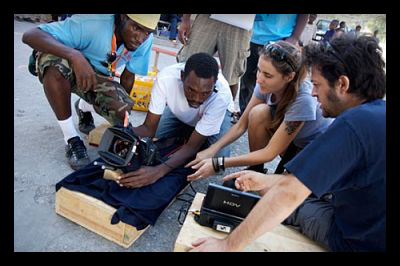Film Institute in Haiti Empowers Youth

In the aftermath of the 2010 earthquake, Haiti has been crippled not only by infrastructural damage, but also by public perception shaped by the media’s exposure of its dire health statistics, political corruption and foreign assistance mismanagement. Despite these unfortunate setbacks and realities, there remains hope for the country’s future showcased in the growing movement of youth empowerment programs. One such agenda, known as the Ciné Institute, utilizes the power of film to promote economic and creative activities for Haiti’s younger generations.
In 2008, the Ciné Institute was founded by an American filmmaker, David Belle, in the southern town of Jakmèl. Belle was driven to advance Haiti’s film industry with a platform that could mold the country’s creative potential and also lift its youth out of poverty. This vision stemmed from Belle’s exposure to a local 2004 film festival that showcased hundreds of free international films. The success of the event illustrated the need and desire for an instrument to mold Haiti’s film industry and feature the nation’s youth.
The film institute is a two year, tuition-free technical film school that offers opportunities in writing, producing, directing, cinematography, sound recording, production design and editing in the field of commercial film production. Upon completion of the program, graduates are eligible to receive contracts and take advantage of entrepreneurial resources from the school’s professional support divisions, Ciné Services and Ciné Support, to continue their ambitions in filmmaking. As of 2012, 88 percent of the Institute’s graduates had received employment or pursued further education abroad. The institute has projected that by 2017 it will create over 2,000 jobs, which is an immense accomplishment for a country that has an unemployment rate of over 40 percent.
The need for higher education in Haiti is urgent. Currently, less than one percent of Haitian high school graduates have the financial means to attend university. Consequently, the country is producing too few innovators and is locked in the cycle of poverty. The Institute aims to combat this issue through the economic and educational opportunities it imparts to its students and graduates. Haiti’s per capita GDP is $733, while a graduate of the Institute averages around $6,000 dollars per year.
Since its establishment, the Institute has had productions ranging from documentaries and commercials to music videos and news reports. During the height of the seismic activity in 2010, the students of the film school – many of whom were directly affected by the disaster – were some of the principal players shooting ground footage of the earthquake’s horrific impacts.
The Institute has received accolades in recognition of its talent. In 2014, some of the Institute’s students were awarded at Cannes International Film Festival and the Webby Awards for their collaborative work on a music video with the band Arcade Fire.
As Haiti continues its efforts to develop and bring its citizens out of poverty, the Institute’s provision of opportunities in technology and arts for its youth will assist the country in meeting its goals.
– Talia Langman
Sources: Cinema Institute, PBS, The Guardian, Wise
Photo: ARC
